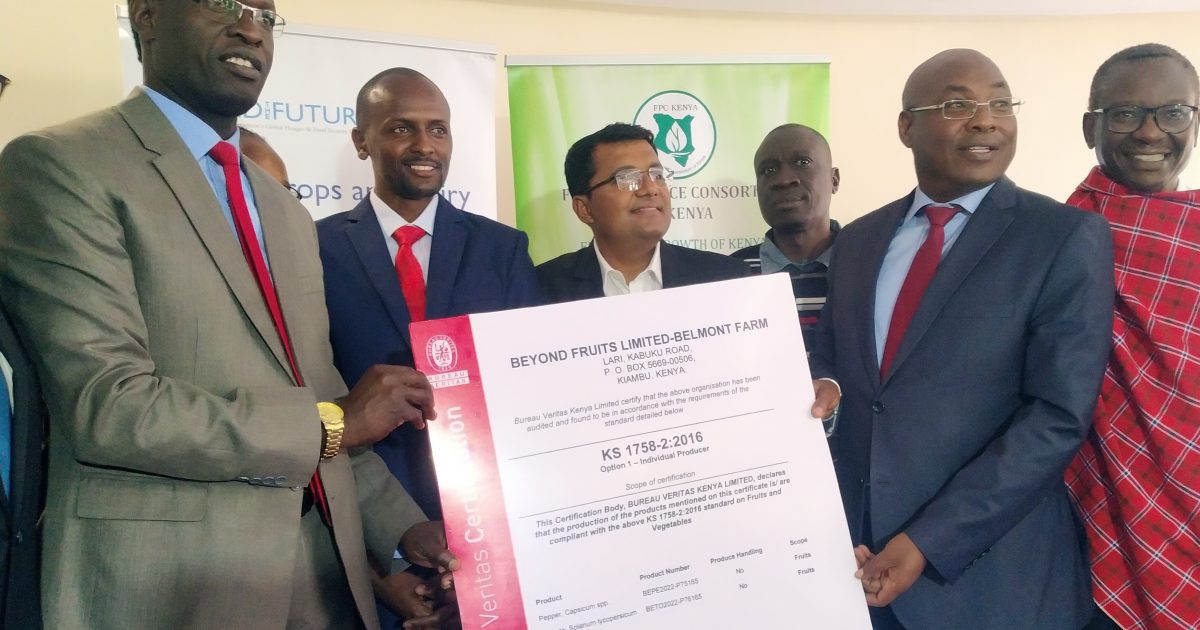Consumers of fresh produce stand to benefit from high quality food, thanks to local value chains that have conformed to Government sponsored and other global standards.
Local food firms are also advancing from the expanded market as consumers continue to increase following the growth of the middle class and the rapid urbanization in the country.
In July 2021, the Agriculture Ministry launched KS1758, a code of practice for the horticulture industry in Kenya which stipulates the hygienic and safety requirements during the production, handling and marketing of fruits, vegetables, herbs and spices.
The first ever company in the Country to receive the KS1758 was the Belmont Farm of Beyond Fruits Limited from Limuru, Kiambu County after successfully implementing the safety measures from farm to fork.
Speaking during the issuance of the certificate to the company yesterday, Principal Secretary, State Department of Livestock in the Ministry of Agriculture Harry Kimtai explained that the standard is an all-round encompassing area of fresh produce namely plant health, food safety, environmental sustainability and worker health, safety and social accountability.
“The KS1758 is a very important mark developed to ensure our produce both meet local and international standards and I want to urge farmers to partner with other off takers so that they are able to produce their food in accordance with regulations and this will not only see them fetch better prices for their produce but it will also lead to better income for returns and investment,” he said.
He congratulated the Belmont Farm for being pioneer to successfully implement and get certified as per KS1758, and also the Fresh Produce Consortium of Kenya (FPC) for working with the company as well as the USAID through the Kenya Crops and Dairy Market Systems (KCDMS), for the financial support.
“Belmont Farm took the risk to support farmers to produce crops in a way that is acceptable and this is the way to go. We need others to emulate them and ensure that we have suppliers producing in accordance to standards and as a country we will be proud to say we are producing safe food,” the PS noted.

In order to support the standards, Kimtai said that the Ministry of Agriculture together with the Health Ministry have jointly developed a food policy to regulate and bring all competent authorities together.
He added that the challenge the market has been facing was the many competent authorities within the government regulating different sectors.
“Now what we want is that when it comes to produce from farmers, it is all done in a coordinated manner”, he explained.
The PS said that the government has also developed food and feed coordination bill that will bring together one coordinator to synchronize all competent authorities to ensure food produced in different sectors meets the food standards and applied across board.
“We want all our food in terms of produce be safe from farm to fork, thus handled safely until it reaches the tables of the consumers and this is how critical the government policy and legal frameworks have been produced to support the private sector as they engage farmers to apply the mark of KS1758”, Kimtai said.
On matters of animal feed shortage that the industry has been experiencing, the PS said they are supporting feed manufactures and confirmed that the country expects the yellow maize consignment in the next couple of weeks. This will ensure availability of feeds and in the long-term reduction of prices when it comes to farm products like milk and eggs.
Fresh Produce Consortium (FPC) has been facilitating local producers of fresh commodities to acquire KS1758 with a view to ensuring consumers enjoy quality products based on the current changing dynamics in the market.
FPC Chief Executive Officer Okisegere Ojepat said acquiring the standards is expected to trigger high demand for fresh produce in the city suburbs as well as growing urban centers.
Local food companies are thus required to comply with set safety standards in order to gain consumer confidence and increase their market share.
“We expect a high demand for food especially in the upper market areas as food companies seek compliance on safety standards. The trend is equally being dictated by the changing food styles following emergence of chronic diseases,” said Ojepat.
Beyond Fruits Limited, a new member of Fresh and Juici Group started in 2017 to cater for the Kenyan Retail market with fresh fruits and vegetables is the first food value chain to be licensed in May this year with a KS1758 certificate.
Beyond Fruits Limited, was supported by a five-year USAID programme -Kenya Crops and Dairy Market System activity (KCDMS) through FPC to implement the KS1758 standard on its 12-acre farm (Belmont Farm) in Limuru as well as its farm to market logistics.
Ojepat further explained that the adoption of the KS1758 is driven by high local consumption produce which currently stands at 96 per cent against four per cent exports that is shipped to European Union markets and other developed markets.
“We expect that export are going to increase to 12 per cent from 4 per cent currently and this will in turn increase revenue even as international market gets more products from us due to compliance at the domestic market,” he said.
He called upon stores to ensure they stock certified products and consumers to demand certified products with the KS1758 mark when they go into the stores or market to buy produce.
Ojepat explained that they started with an easy entry point which is organized grocery such as Beyond Fruits but are also targeting hotels and Kongowea market in Mombasa, which imports food from other counties, but also looking at all counties, groceries.
USAID-Kenya Crops and Dairy Market Systems (KCDMS) lead Dr. Robert Mwadime said it is necessary to address food safety issues considering the prevalence and increase of diseases such as Cancer and others that relate to either food poisoning or food safety
“It should be of great concern what we are feeding our people, what we choose to eat and also careful about what we eat. As USAID we are going to increasingly start getting involved and investing in ensuring that what we eat is safe,” he said.
Horticulture sub sector is a major category within the agriculture sector, with 201 different types of crops, which accounts for 80 per cent of the total crop being grown in this Country.
The sub sector which is a key contributor to food and nutrition security, continues to register an annual growth rate of about 15 per cent, according to the Kenya National Bureau of Statistics report of 2020.
In 2021, the sub sector generated Sh158 billion from export of flowers, vegetables, fruits, herbs and spices.
By Wangari Ndirangu





